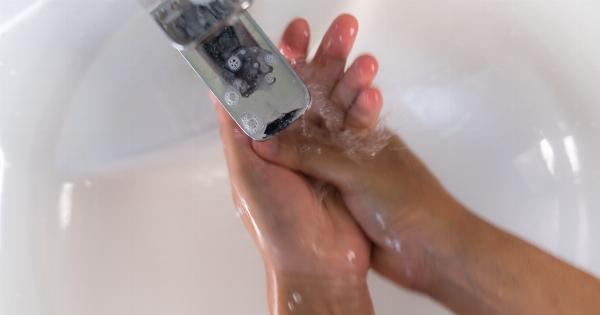A urinary tract infection (UTI) is a common bacterial infection that affects the urinary system, which includes the kidneys, bladder, ureters, and urethra.
UTIs can be painful and cause discomfort, and if left untreated, they can lead to more serious complications.
One of the most effective ways to prevent UTIs is by staying properly hydrated and maintaining a healthy water intake.
In this article, we will explore the relationship between water intake and UTI prevention, and provide you with essential information to keep your urinary system healthy.
What Causes UTIs?
UTIs are usually caused by bacteria entering the urethra and traveling up to the bladder. The most common type of bacteria responsible for UTIs is Escherichia coli (E. coli), which is found in the gastrointestinal tract.
Certain factors can increase the risk of developing a UTI, such as:.
Poor Hygiene
Insufficient personal hygiene, especially in the genital area, can increase the likelihood of bacteria entering the urinary system.
Sexual Activity
Sexual intercourse can introduce bacteria into the urethra, making women more prone to UTIs. This is why it is recommended to urinate before and after sexual activity to flush out any bacteria that may have entered the urethra.
Urinary Tract Abnormalities
Anatomical abnormalities or structural issues within the urinary system can make UTIs more likely. These abnormalities can include urinary stones, kidney cysts, or a urethral stricture.
Compromised Immune System
A weakened immune system due to conditions like diabetes or HIV/AIDS can diminish the body’s ability to fight off infections, increasing the risk of UTIs.
Insufficient Water Intake and UTI Risk
Staying hydrated is crucial for maintaining overall health, and it also plays a significant role in UTI prevention.
Drinking an adequate amount of water helps to flush out bacteria from the urinary system and dilutes urine, making it less irritating to the bladder and urethra.
When you don’t drink enough water and become dehydrated, your urine becomes concentrated. This concentration can cause the urine to become more acidic, creating an environment that promotes bacterial growth and the development of UTIs.
Additionally, low urine volume resulting from insufficient water intake reduces the frequency of urination. Infrequent urination allows bacteria to multiply and establish an infection in the urinary tract.
How Much Water Should You Drink?
The amount of water you should drink each day depends on various factors, including your age, sex, level of physical activity, and overall health.
As a general guideline, the National Academies of Sciences, Engineering, and Medicine recommends a daily water intake of about 3.7 liters for men and 2.7 liters for women.
It’s important to note that these recommendations include all fluids consumed throughout the day, including water from beverages and foods. Foods with high water content, such as fruits and vegetables, also contribute to your daily water intake.
If you have a history of frequent UTIs or are at a higher risk of developing UTIs, your healthcare provider may recommend increasing your water intake further for enhanced UTI prevention.
Signs and Symptoms of a UTI
It’s crucial to recognize the signs and symptoms of a UTI to seek appropriate medical attention and prevent complications. The common symptoms include:.
1. Pain or a burning sensation during urination
One of the most common symptoms of a UTI is experiencing pain or a burning sensation while urinating. This sensation is often described as a stinging or intense discomfort.
2. Frequent urination
Feeling the need to urinate more often than usual, even if your bladder is not full, can be a sign of a UTI.
3. Cloudy or strong-smelling urine
If your urine appears cloudy or has a strong, unpleasant odor, it may indicate a urinary tract infection.
4. Blood in urine
Urinary tract infections can sometimes cause blood to appear in the urine. If you notice pink, red, or brown-tinged urine, it’s important to seek medical attention.
5. Pelvic pain or pressure
Some individuals with UTIs may experience pain or pressure in the lower abdomen or pelvic area.
If you experience any of these symptoms, it’s advisable to consult a healthcare professional for proper diagnosis and treatment.
Other UTI Prevention Strategies
In addition to maintaining adequate water intake, there are other strategies you can incorporate into your routine to reduce the risk of UTIs:.
1. Practice proper hygiene
Keeping the genital region clean and dry is essential for preventing bacterial growth. Wiping from front to back after using the toilet can also minimize the risk of introducing bacteria into the urethra.
2. Urinate before and after sexual activity
Urinating before and after sexual activity can help flush out any bacteria that may have entered the urethra during intercourse.
3. Wear breathable underwear
Avoid wearing tight-fitting underwear or clothing made of non-breathable materials, as they can trap moisture and create an environment conducive to bacterial growth.
4. Stay away from irritating feminine products
Avoid using harsh soaps, douches, powders, or other feminine hygiene products that can disrupt the balance of bacteria in the genital area and increase the risk of UTIs.
5. Consider cranberry products
Some research suggests that cranberry products, such as cranberry juice or supplements, may help prevent recurrent UTIs by preventing bacteria from adhering to the bladder walls. However, more studies are needed to confirm these findings.
Conclusion
Proper water intake is a crucial aspect of UTI prevention. Staying hydrated helps to flush out bacteria from the urinary system and dilute urine, reducing the risk of UTIs.
Adequate water intake, alongside other preventive measures like practicing good hygiene and urinating before and after sexual activity, can significantly reduce the likelihood of developing a UTI.






























